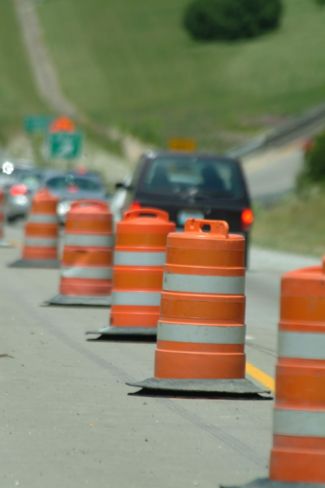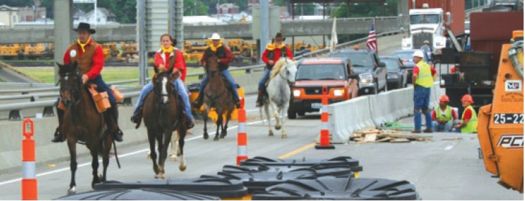Category:616 Temporary Traffic Control: Difference between revisions
article construction |
m article construction |
||
| Line 20: | Line 20: | ||
{|style="padding: 0.3em; margin-left:15px; border:1px solid #a9a9a9; text-align:center; font-size: 95%; background:#f5f5f5" width="760px" align="center" | {|style="padding: 0.3em; margin-left:15px; border:1px solid #a9a9a9; text-align:center; font-size: 95%; background:#f5f5f5" width="760px" align="center" | ||
|- | |- | ||
|colspan=" | |colspan="4"|'''Work Zone Figures''' | ||
|- | |- | ||
|[[media:616 | |[[media:616 Sign and Device Legend.pdf|Sign and Device Legend]]|| || ||[[media:616 1.1 Traffic Control Work Zone.pdf|Traffic Control Work Zone]] | ||
|- | |- | ||
|[[media: | |[[media:616.1.2 Sign Spacing Device Spacing.pdf|Sign Spacing Device Spacing]]||[[media:616.1.3 Intermediate Lane Closure.pdf|Intermediate Lane Closure]]||[[media:616.1.4 Beginning and End of Project.pdf|Beginning and End of Project]]||[[media:Figure 616.2.1.2 Side Road Tapers.pdf|Side Road Tapers]] | ||
|- | |- | ||
|[[media:616.2.3 work Zone Fine Sign.pdf|WORK ZONE FINE signing sequence]]||[[media:Figure 616.2.5 Road Closed Beyond.pdf|a typical detour | |[[media:616.2.1 Truck and Equipment Crossing.pdf|temporary truck crossing]]||[[media:616.2.2 Two-lane Undivided Highway.pdf|other channelizing devices]]||[[media:616.2.3 work Zone Fine Sign.pdf|WORK ZONE FINE signing sequence]]||[[media:Figure 616.2.5 Road Closed Beyond.pdf|a typical detour]] | ||
|- | |- | ||
|[[media:616.2.7 Signs in NarrowMedians.pdf|guidance for signs in narrow medians]]||[[media:616.5.1 Sign Spacing Device.pdf|channelizer spacing]]||[[media:616.5.2 Lane Closure.pdf|lane closure]] | |[[media:Figure 616.2.6 One-Lane Two-Way Operation.pdf|One-Lane Two-Way Operation]]||[[media:616.2.7 Signs in NarrowMedians.pdf|guidance for signs in narrow medians]]||[[media:616.5.1 Sign Spacing Device.pdf|channelizer spacing]]||[[media:616.5.2 Lane Closure.pdf|lane closure]] | ||
|- | |- | ||
|[[media:616.13 Crossover on Divided Highways.pdf|Crossovers on Divided Highways]]||[[media:616.13 Standard Temporary.pdf|Temporary connections used at the terminus of divided lane facilities]] ||[[media:238.4 Documentation Record Form C-258.doc|documentation record (Form C-258)]] | |[[media:616.13 Crossover on Divided Highways.pdf|Crossovers on Divided Highways]]||[[media:616.13 Standard Temporary.pdf|Temporary connections used at the terminus of divided lane facilities]] ||[[media:238.4 Documentation Record Form C-258.doc|documentation record (Form C-258)]]|| | ||
|} | |} | ||
Revision as of 14:08, 23 October 2007

Attention to the safety of travelers is especially important in work zones.
The workspace is the area closed to traffic and set aside for workers, equipment and material. Work zone signing items such as regulatory signs and Type III Movable Barricades and other work zone items such as Changeable Message Signs, flashing arrow panels, channelizing devices, lighting devices and signals are specially designed to minimize risk to workers and travelers. Pavement edge treatment is frequently included in work zones as are practices such as crossovers, temporary connections and detours.
The work zone duration and location of work are discussed in this article. There are many aspects to be considered when inspecting construction quality and this article provides construction inspection guidelines.

Temporary traffic control devices warn motorists of hazards, advise the proper path through the work area, delineate areas where travelers may not operate and separate them from workers and opposing traffic. Whenever worn or damaged devices appear in a work zone, the general quality of the work zone deteriorates. To avoid this, MoDOT has provided quality standards for temporary traffic control devices.
To provide uniform flagging and to train employees how to protect themselves, co-workers and travelers, MoDOT requires flagger training.

Every day MoDOT has many work zones on Missouri's highways. MoDOT is committed to providing safe and efficient movement of both motorized and non-motorized traffic through or around temporary traffic control work zones and providing protection for workers and equipment located within these work zones. To better educate technicians and those designing and managing temporary traffic control work zones, Work Zone Technician Training and Advanced Work Zone Training is available.
This article also provides law enforcement services, traffic control for non-motorized traffic and transit considerations.
The historical document, Traffic Control for Field Operations, contains information on temporary traffic control measures.
Articles in "616 Temporary Traffic Control"
The following 27 pages are in this category, out of 27 total.
6
- 616.1 General (MUTCD Chapter 6A)
- 616.2 Fundamental Principles (MUTCD Chapter 6B)
- 616.3 Temporary Traffic Control Elements (MUTCD Chapter 6C)
- 616.4 Pedestrian and Worker Safety (MUTCD Chapter 6D)
- 616.5 Flagger Control (MUTCD Chapter 6E)
- 616.6 Temporary Traffic Control Zone Devices (MUTCD 6F)
- 616.7 Type of Temporary Traffic Control Zone Activities (MUTCD 6G)
- 616.8 Typical Applications (MUTCD 6H)
- 616.9 Control of Traffic Through Traffic Incident Management Areas (MUTCD 6I)
- 616.10 Product Requirements for Temporary Traffic Control Devices, Pavement Marking and Delineation
- 616.11 Traffic Control for Waterways
- 616.12 Work Zone Speed Limits
- 616.13 Work Zone Capacity, Queue and Travel Delay
- 616.14 Work Zone Safety and Mobility Policy
- 616.15 Transit Considerations
- 616.16 Law Enforcement Services
- 616.17 Pavement Edge Treatment
- 616.18 Construction Inspection Guidelines for Sec 616
- 616.19 Quality Standards for Temporary Traffic Control Devices
- 616.20 Flagger Training
- 616.21 Work Zone Technician Training
- 616.22 Advanced Work Zone Training
- 616.23 Traffic Control for Field Operations
- 616.24 Traffic Control for Non-Motorized Traffic
- 616.25 MoDOT Work Zone Guidelines
- 616.26 Work Zone User Training
- 616.27 MoDOT Fleet Lighting